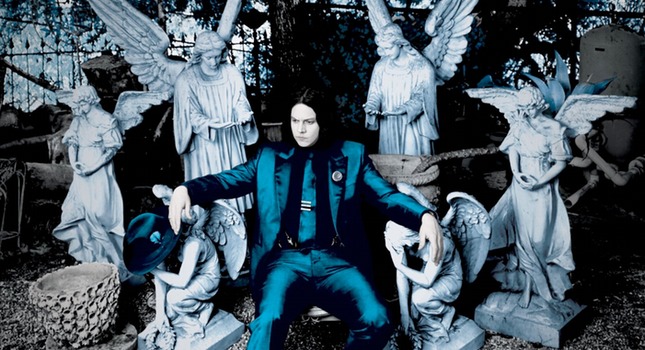
There’s a lot of tradition and homage to the past in and amongst the album, but where things don’t quite hit the mark are when Jack tries his hand at embracing more modern sounds. It’s entirely possible that this is wholly intentional from the former White Stripes front man, but we’re not going to attempt to get under the skin of the psychology of the album, leaving speculation about his divorce from Karen Elson and talk of his nostalgic affinity with the past and insular sentiments out of the equation as best we can.
Lazaretto is riddled with false leads and hidden disorder, so it seems pointless to try to carve it up too much without having White’s grey bits on a slab for dissection, which we’d be loath to do. Plus we’d probably get it wrong anyway with the amount of misdirection and former tales that seem to be a big part of the record.
When we first heard opening track, Three Women, we really struggled with it and unlike a lot of what’s to follow this impression hasn’t really changed all that much the more we listened to it. The “lordy lord” repetition chorus is affected in the extreme and the jingling musicality of it just frustrates a little too much. Luckily it end on a cool freak out high, which it does a good job of salvaging the vestiges of a few positives.
While there’s some cool sounds on title track, Lazaretto, with it’s crunching guitar, feedback, funk bass lines and reverb laced synth chimes, there’s also a bit too much likeness to rap in White’s vocals that makes you feel like you’ve transformed into a dog and someone’s stroking you backwards. Ripping out lines like he’s been spending a bit too much time listening to Eminem it leaves the track with too many question marks, despite the fact that it’s the lead single for the release.
Temporary Ground is a beautiful track with great lyrics. It’s built on a country and bluegrass framework that combines piano keys, great violin harmonies and class slide guitar. Over this you’ve got a very well delivered duet featuring the all embracing female vocals of Lillie Mae Rische, who also provided the fiddle melodies for the song.
It’s followed up by Would You Fight For My Love?, which is a dark blues track with more piano riffs. The organ fuelled undercurrent of the song is what makes it so effective and while it loses it’s way a little after the halfway mark, it pulls it back a little with strong backing vocal hight notes from Ruby Amanfu.
Randomly, our favourite track on Lazaretto is the instrumental beast that is High Ball Stepper. As is often the case with Jack White’s song structure, it builds layers of crunch as is goes, getting progressively thunderous, in spite of the occasional lull, as it steps up to brink with it’s ambiguous close. We can’t quite make out what it is that makes the piercing woawa sounds throughout the track, but whatever they are, they sound epic and you can watch the video to the track on our Lazaretto details page.
Things get a bit rockabilly on Just One Drink, which sees White getting into more duet action with a husky sounding Ruby Amanfu, so if you’ve been wondering who sings the female backing vocals on Just One Drink, now you know. We love the piano and violin harmony intersections and the drive of the electric guitar that picks up part way through helps to keep things moving right the way to the end.
Alone In My Home is another beautiful duet, this time bringing Rische back to the fore once again with some nice vocal interplay between her and White. It’s got a great intro and the acoustic guitar tee up to the piano lay downs is incredibly infectious. The lyrics are genius with the lines “becoming a ghost”, being “all alone in my home” where “nobody can touch me” and “lost feelings of love that hover above me” sound profound no matter what outlook you approach them from.
There’s more country and bluegrass on Entitlement, which has some very cool echo and reverb driven slide guitar. The fundamentals of what we should and shouldn’t be entitled to is laid out bare in the cryptic lyrics before it’s swept away by the dark ska-like blues of That Black Licorice. It makes for good variation towards the album, but again there’s just a hint of rap splat from White on Licorice, which taints the sheen just a little for us.
I Think I Found The Culprit gets a bit profound from the half way point on with the lyrics, “birds of a feather we lay together, but the uglier one is always under the gun”, as it continues the enshrouded section of the final third. The female high note vocal backing wails add a lot to the track, despite their fleeting presence.
The album closes on Want And Able, which is a bit of a conundrum of a piano track with more whos that the Tardis. It’s a lovely rambling flourish to the record with thoughtful lyrics that reiterate the difference between desire and the ability to fulfill them.
As is always the case with Jack, you eventually come round to his way of thinking in the end. We can’t say that Lazaretto blew us away to begin with, and it’s definitely not quite as well worked as his first solo album, Blunderbuss, but it has a way of flooding your consciousness the more you listen to it. We’d definitely veto JW getting any more influence from Marshall Mathers, but that doesn’t do enough to take away from the overall impact of the album.
Jack White, Lazaretto album review: 4/5


